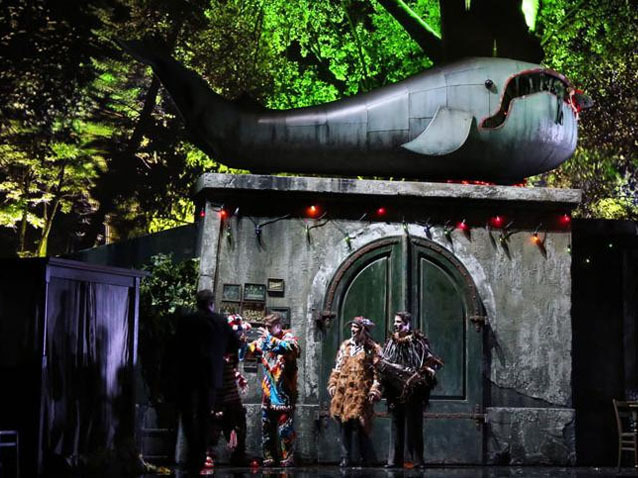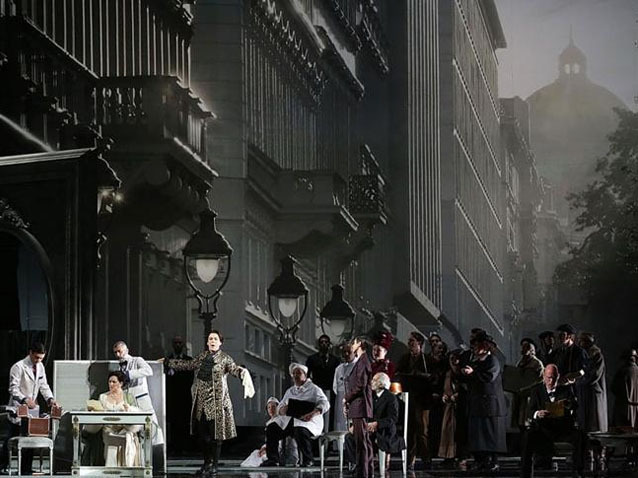 © DR
© DR
Quite remarkably, as demanding as this opera is, and outside a German-speaking country, Der Rosenkavalier has recently become fixture of La Scala seasons, now appearing in its third production within the last 13 years. This time, the deep and yet lighthearted, bittersweet comedy turned out again a favorite of the Milanese audience, which had been graced with a very early staging back in March 1911, barely six weeks after the Dresden world premiere. Harry Kupfer, former director of the Komische Oper Berlin, signed the staging (a coproduction with the 2015 Salzburg Festival) along with set designer Hans Schavernoch, video designer Thomas Reimer and light designer Jürgen Hoffmann. They offered a consistent, fascinating interpretation based on the core concept of nostalgia: the passing of time, mainly the Marschallin’s perception of her present and future – and by reflection our own lives – has effectively been adopted as theme in perspective. This is revealed already from the color scheme (silver, grey, white, with a tinge of Venetian green) dominating both settings and costumes; from the video projections showing views of Vienna (not so much Maria Theresia’s 18th-century capital, but rather the Belle-Époque turn-of-the-century thriving city of grand buildings around the Ring, e.g. the Staatsoper); from the melancholic rows of trees in the foggy horizon the audience is acquainted with since Act 1 and which come back in the opera final trio; from the first appearance of the Marschallin, mirroring herself in a scene brimming with light as the curtain opens, with the white marble of the Hofburg reflecting out of the windows, and gazing at the autumn landscape at the end of this same act.


Spaces are very cleverly handled by Kupfer. Just consider the opera’s first scene, simply made up by two single oversized items: the essential bedroom door, mounted over a revolving platform which later turns into a comfortable reception room, and the mirror. While the singer’s presence is often crucial to the transformation from one environment to the following (e.g. as Sophie catalyzes all the attention as she awaits Octavian’s offering of the silver rose in Act 2), the audience witnesses a number of memorable situations in which staging, voices and orchestra powerfully converge, both towards the tragic (the Marschallin’s monologue in act 1) and the comical (the apparitions in Act 3). After a flawless, impressive Act 1, when the pace-keeping makes one forget the duration of over 80 minutes, Act 2 turns out far less successful in animating the static setting (a hall in Faninal’s house); nor is the acting, for example the quarrel on the servants, always effective. Act 3 inspires Kupfer with the brilliant idea of transforming the “private room in an inn” into the open-air of a Viennese “Heuriger” in the Prater Park, recalling Viennese operetta situations such as in Wiener Blut, where a sizeable crowd of characters can comfortably act out their lively comedy and the Marschallin finally appears as from another dimension, evoking the Countess in Figaro’s last scene.
Most warmly welcomed by La Scala audience, Zubin Mehta, just turned 80, conducted masterfully, constantly featuring a smooth pace perfectly timed to the action, so that each episode of the opulent score directly flows into the next one. Notwithstanding the massive orchestration, the orchestra never overshadows the singers: its transparent sound makes nuances always evident, leaves room to the poignant cello solos, adopts an extremely convincing swing for the frequent waltz rhythm; just to consider Act 3, it sports powerful dynamic contrasts in the prelude, lively accompaniment to the chaotic scene preceding the Marschallin’s arrival and shows all the ability to convey the subtlest emotional depth in the final trio.
In the large cast, the most memorable personality is certainly that of Günther Groissböck’s Baron Ochs. The Austrian Bass lend the central male character a powerful voice and an accomplished ability in acting, particularly natural, effective and energetic in depicting the inelegant, rude nobleman, as excellently shown from the start in the vital Act 1 Leporello-inspired monologue. Krassimira Stoyanova and Sophie Koch are completely at ease with the roles of Marchallin and Octavian, perfectly fitting to both performers, as it is Christiane Karg’s Sophie. However, as enjoyable as their voices all are (Stoyanova’s warm, rounded sound, Koch’s vibrant, dramatic low register, Karg’s delicate presentation in Act 2), there is hardly ever a hint of anguish to provide contrast, as if the frailty and anxiety expressed in the Octavian-Sophie duets from Acts 2 and 3 were resolved in the pure beauty of the energetic sound of youth. The successful team-work is completed by the talented performers of the other roles, such as Adrian Eröd (Faninal), Silvana Dussmann (Marianne), Thomas Bauer (the Police Commissary).
Raffaele Mellace
the 17 of June, 2016 | Print
Comments